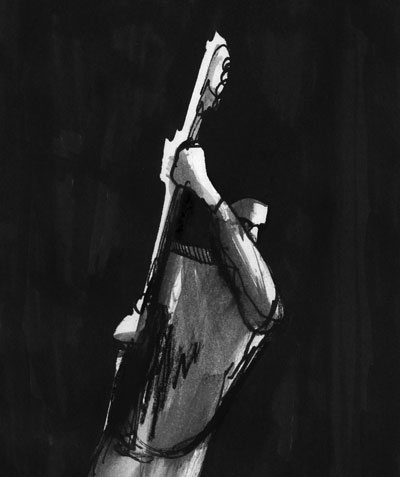 Every Saturday, we’ll be posting a new illustration by David Lester. The Mecca Normal guitarist is visually documenting people, places and events from his band’s 27-year run, with text by vocalist Jean Smith.
Every Saturday, we’ll be posting a new illustration by David Lester. The Mecca Normal guitarist is visually documenting people, places and events from his band’s 27-year run, with text by vocalist Jean Smith.
Continued from May 14
Every day at the International Pop Underground convention, Anita saw Calvin and Candice of K Records talking to people who looked like they were in bands. She wanted to run up and hug them, thank them, tell them how much the IPU meant to her. How happy she was. But she couldn’t.
Anita loved Kicking Giant, and she thought it might be OK to try and say something to Tae when she saw him walking out of the Smithfield Café.
“I play bass if you ever need a bass player,” she said, and Tae laughed, in a nice way, and said they wouldn’t be needing a bass, which Anita, of course, already knew.
Tae said he appreciated her talking to him because he was from New York and didn’t know many people in town. He had a lovely round laugh, and he seemed genuinely happy that they’d met. Kicking Giant made Anita feel like she could do things differently, that she didn’t have to follow any rules.
“If you ever want to do a show in Ellensburg, I can set it up for you,” she said. “I can’t guarantee what the money would be like, but you can stay in my room and I’ll sleep on the couch. My parents won’t mind. I can make you both breakfast in the morning.”
Anita wrote down her address and asked Tae to send her a letter. Which he did, months later, saying what he’d been doing since the IPU.
In 1992, Anita moves to New York City. She joins a grunge band with three guys, one of whom is guitar player Joe Lancaster. They try to get spots opening for Sub Pop bands that come through. Riot grrrl is well underway when Anita and Carol go to see Kicking Giant play CB’s 313 Gallery. After the set, Anita goes over to Tae.
“I talked to you in Olympia, at the IPU,” she says. “Before the Bikini Kill show, outside the Smithfield.”
“Right,” says Tae. “You were going to put on a show for us, right?”
“Yes, I said you could stay at my parents. How embarrassing,” says Anita.
“It was very sweet.”
“I was such a geek back then,” Anita says.
“Oh well,” he says. “Maybe it’s not so bad being a geek.”
“You know, I moved to New York because of Kicking Giant and you’d moved to Olympia by the time I got here,” she tells Tae while he’s packing up his black and white Rickenbacker guitar.
Back at their table, Anita tells Carol, “I sort of wish he hadn’t remembered me. I was such a geek.”
“That was, like, last year, Anita,” says Carol. “He’s probably just saying he remembers you.”
“He wouldn’t do that,” says Anita.
“How do you know?” Carol asks, growing weary of Anita’s enthusiasm for all things lo-fi and uber sincere.
“He just wouldn’t. That’s not what they’re about.”
“OK, what are they about? Maybe you can explain it to me,” Carol says.
“Kicking Giant made it seem like anything was possible. Rachel standing there, feet shoulder width apart, pounding out these tribal beats and Tae on the edge of something excruciating, twisting and snapping his body around with that big guitar feeding back mercilessly. I couldn’t believe they were from New York. These two people saying, ‘We’re a band and these are our songs.’ No apology, no context. None that I knew of, anyway. They took themselves seriously. It gave me hope about living here. About trying to play music.”






